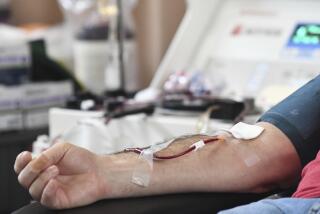Blood Donating by Gulf War Vets Banned for Year
- Share via
WASHINGTON — Persian Gulf War veterans will be prohibited from donating blood for at least a year in an effort to prevent the spread of a blood-borne organism that so far has sickened 22 soldiers, officials said Tuesday.
Officials stressed, however, that the move is precautionary. Dr. William Sherwood, acting senior vice president for biomedical services for the American Red Cross, said that “all indications are that the blood supply is safe from this disease.” Health officials are as yet uncertain whether it can even be transmitted through a blood transfusion.
The organism, a parasite called Leishmania tropica , can cause skin lesions and, in rarer cases, fever, fatigue and diarrhea; it is transmitted to humans through the bite of a tiny sand fly.
The rejection of about 540,000 civilian and military Persian Gulf war veterans as potential blood donors--a policy expected to remain in place until January, 1993--is likely to cause some spot shortages in blood supplies across the country, especially in areas with large military populations.
As a result, civilian and military medical officials appealed to Americans who have not visited the Persian Gulf since August, 1990, to give blood to compensate for the projected shortages.
“It’s something you’d rather not have to do,” said Pentagon spokesman Bob Hall about the decision to block blood donations from Persian Gulf veterans. “The military community is one of the biggest donors of blood. We’d rather not cut 500,000 of them out of the donation process.”
But Hall and other health professionals said that the policy was instituted to minimize the possibility of contaminating the nation’s blood supply. The effect of the prohibition, they added, should be manageable.
Despite the large military presence in San Diego County--more than 100,000 active-duty personnel are stationed in the county--the prohibition against Navy and Marine personnel donating blood was not expected to have much impact, local officials said. About 50,000 troops from San Diego County were sent to the Persian Gulf.
Sam Samuelson, public affairs officer for the Navy Hospital in Balboa Park in San Diego, said that the only known case of leishmaniasis recorded locally occurred in April and “that person is fine now.”
Stephanie Casenza, spokeswoman for the San Diego Blood Bank, which monitors blood donations throughout San Diego County, said the deferrals of blood from military donors is not expected to cause even spot shortages of blood.
Marcia Lane, speaking for the American Assn. of Blood Banks, said that 40,000 pints of blood are needed each day for normal patient care across the country. The American Red Cross projected that by excluding recent visitors to the Persian Gulf, it would lose up to 10,000 prospective donors.
The ban was issued after 22 American soldiers tested positive for antibodies to the parasitic disorder known as leishmaniasis. While 15 of the soldiers had contracted a mild form of the disease and suffered from ulcerous skin lesions, seven soldiers developed a more serious form--visceral leishmaniasis--which causes diarrhea, fever, chills, weight loss and anemia.
A related disorder can lead to suppression of the immune system, as well as liver or spleen damage. But researchers stressed that the cases they have discovered among soldiers run their course without causing diseases that are chronically debilitating, life-threatening or fatal.
Furthermore, they added, U.S. military doctors, who have coped with the disease for 14 years among troops deployed to the tropics, have concluded that it is “easily treatable” using a British-made drug.
Gen. Ronald Blanck, director for professional services in the U.S. Army Surgeon General’s office, said that investigators will try to determine whether and how the disease can be transmitted by blood. Several related strains of the leishmaniasis organism can be transmitted through blood transfusions. But there are no known cases of this specific form being transmitted by transfusion of contaminated blood, officials stressed.
They added that none of the 22 soldiers who have fallen ill with the disease had donated blood since their return from the Persian Gulf. It could take two years for those bitten by sand flies carrying the parasite to develop the disease, according to Col. Charles Oster, chief of infectious disease at the Walter Reed Army Medical Center, where all 22 stricken soldiers have been treated.
More to Read
Sign up for Essential California
The most important California stories and recommendations in your inbox every morning.
You may occasionally receive promotional content from the Los Angeles Times.














